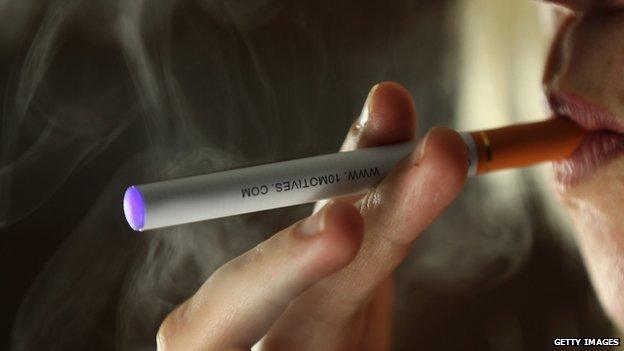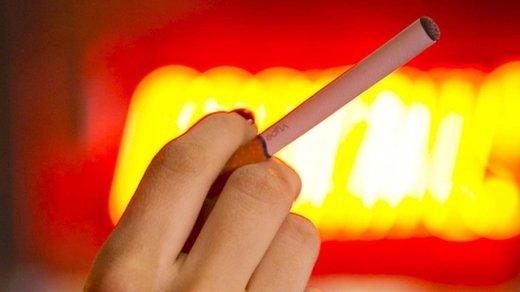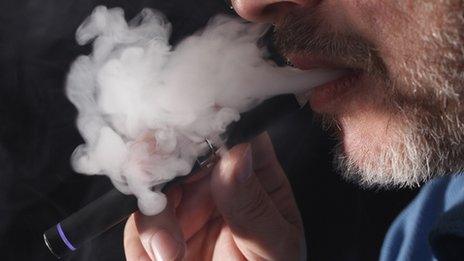E-cigarettes and the vape debate
- Published
- comments

E-cigarettes have avoided federal regulation - so far
Electronic cigarettes, which some say are a safer alternative to smoking or a first step to quitting, are under fire.
Because e-cigarettes are so new, they're relatively unregulated. Now some lawmakers are starting to take action against the practice of smoking them, otherwise known as "vaping".
Democratic Senator Dick Durbin and Representative Henry Waxman recently joined nine other lawmakers in writing a report, external titled Gateway to Addiction? which found that all seven e-cigarette companies surveyed used marketing techniques that targeted young people, such as free samples and sponsored events such as rock concerts. It found that flavours such as Cherry Crush, Peachy Keen and Chocolate Treat also drew in younger users.
In the wake of the report, Mr Durbin and Mr Waxman urged the Food and Drug Administration to clamp down on the marketing strategies used to promote e-cigarettes and to prohibit the enticing flavours.
Their campaign has found plenty of support.
"Vape if you want," writes, external Robert McCartney for the Washington Post. "That's your business. But don't give tobacco companies free rein to profit by manipulating the public's mind and jeopardising its health."
He says that if e-cigarettes are not regulated, the tobacco industry could create a new generation of nicotine addicts and undo 50 years of progress in combating smoking.
The true health consequences of e-cigarettes are yet unknown. The three main ingredients of e-cigarettes are nicotine, flavouring and propylene glycol.
While some data shows nicotine can dangerously weaken the immune system, the flavouring seems to be harmless. That makes propylene glycol the wildcard. Since it usually it shows up in products such as soft drinks, salad dressing, shampoos and soaps, there is good data about the safety of eating it or applying it to one's skin. But the effects of inhaling it are not yet understood.
There are also concerns, external that there could be cancer-causing substances in the vapour and metals on the coils inside the e-cigarette.
PolicyMic's Cameron English doesn't buy it, external, pointing out that e-cigarettes help smokers rid themselves of a habit that's proven to be hazardous.
"As cigarette consumption both around the world and in the United States continues to drop, we should acknowledge that the growing popularity of e-cigarettes is a massive win for public health," he writes.
So far, the only verified risk seems to be injury by explosion.
Mother Jones's Dana Liebelson and Asawin Suebsaeng recently, external penned a history of e-cigarette explosions and fires, including the story of a barmaid in a North Yorkshire pub who was hit earlier this month by a piece of an exploding e-cigarette that had been left charging.
With all of this uncertainty about whether vaping constitutes a health risk, the editors of USA Today say, external that the FDA should err on the side of safety and treat e-cigarettes the same way they treat normal cigarettes - banning sales to children and any use indoors.
"The Food and Drug Administration, which has been slow to assert its authority to regulate e-cigarettes, ought to get on with it," they write.
In Forbes, Jacob Sullum disagrees, external, accusing the Durbin-Waxman report of being simplistic, especially when it claims that e-cigarettes are being marketed to children.
"In truth, the rap against fruity e-cigarette fluid is the same as the rap against flavoured cigars, sweet alcoholic beverages, and cannabis-infused chocolate bars: Adult products cannot be tolerated if they might taste good to kids,"
And beyond that, there is data that shows e-cigarettes are effective in lowering the number of people addicted to smoking.
"If the FDA follows Durbin's advice, it will ban most e-cigarette flavours, making the switch less appealing to smokers who prefer the prohibited varieties, and restrict e-cigarette advertising, making smokers less aware of a competing product that could literally save their lives," he writes.
With little proven scientific information - whether about the safety of e-cigarettes or even whether they have helped people quit smoking - this debate is like shouting in a dark room. There's lots of noise, but little light.
(By Kierran Petersen)
- Published6 December 2012

- Published9 April 2014

- Published2 April 2014

- Published2 April 2014
